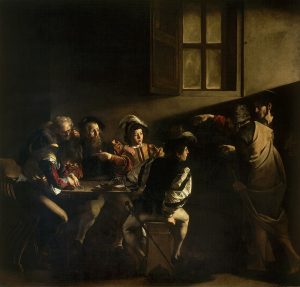The Feast of St. Matthew falls on September 21, but churches for which St. Matthew is the patron may celebrate it this Sunday in place of the usual Sunday of Pentecost.
Thoughts on Sunday’s Lessons for Sept. 22, 2024 (Feast of St. Matthew)

The Calling of Saint Matthew (c.1599-1600), oil painting on canvas by Caravaggio (1571-1610). Contarelli Chapel, Church of San Luigi dei Francesi, Rome. (Click image to enlarge.)
First Reading: Proverbs 3:1-6
We celebrate the Feast of St. Matthew with readings chosen to reflect the tradition of the tax collector turned apostle and evangelist. In our first reading, the Book of Proverbs advises us to keep God’s commandments and use them to guide our lives, If we do so, Proverbs assures us, we will be amply rewarded with a good life and good reputation. Perhaps this message can invite us to reflect on Matthew’s conversion from hated tool of empire to faithful follower and recorder of Christ.
Psalm: Psalm 119:33-40
The Psalmist’s message, a brief snippet drawn from the longest of all the psalms, echoes this day’s reading from Proverbs: Learn God’s laws and commandments as set down in God’s teaching, the Torah, and follow them faithfully, we hear; God’s way turns us away from what is worthless. And, in an admonition perhaps relevant to the life of Matthew the tax collector, “Incline my heart to your decrees, and not to unjust gain.”
Second Reading: 2 Timothy 3:14-17
This passage from the second letter of Timothy, a short pastoral epistles written in Paul’s name decades after his time, echoes the Psalmist’s call for unity in tradition guided by Scripture. Speaking of the Tanakh, the Hebrew Bible, (the New Testament did not yet exist), it invited early Christians to use its writings for inspiration from God, declaring that Scripture is “useful for teaching, for reproof, for correction, and for training in righteousness,” preparing followers to be proficient and equipped for every good work.
Gospel: Matthew 9:9-19
The Scribes and Pharisees often criticized Jesus for associating with people who the authorities considered suspicious at best. Jesus was often found in the company of prostitutes, drunks and lepers; women, foreigners, and maybe worst of all, tax collectors, those despised collaborators who extracted the Roman empire’s taxes from their neighbors. Matthew was one of those hated civil servants. Yet, in spite of this outcast status, he hurried to follow Jesus, and when he invited Jesus to his home for dinner, Jesus happily came along. Jesus shows us how to love our neighbors – all of our neighbors – not just the comfortable ones.
